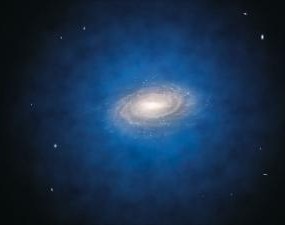 I wrote about the missing dark matter debacle back in April for my Pivot Points column in The Euroscientist. The post is now online. There has been much debate as to whether or not the evidence stacks up against this truly unknown quantity that we cannot touch, see, or measure.
I wrote about the missing dark matter debacle back in April for my Pivot Points column in The Euroscientist. The post is now online. There has been much debate as to whether or not the evidence stacks up against this truly unknown quantity that we cannot touch, see, or measure.
I talked to Christian Moni-Bidin of the University of the Conception, Chile, who has demonstrated that one of the predictions for dark matter simply fails in his team’s detailed observations. “There seems to be a rapidly increasing evidence that things could not be as we thought,” Moni-Bidin told me. His work, based on galactic dynamics, is just another experiment in a string of findings that seem to suggest dark matter may be stranger than we could imagine or simply not exist at all.
“[Our] finding you mention [in Pivot Points] is certainly interesting,” he adds, “but you can insert it in a series: for example, a few days before the publication of my work, Karachentsev showed a surprising lack of dark matter in the entire local universe (arXiv:1204.3377), while some time ago Jalocha et al. (2010, MNRAS, 407, 1689) also reached similar conclusions from a different point of view.” Moni-Bidin asks whether we are witnessing a radical change in our understanding of the Universe but admits that, “It’s probably too early to tell.”
There are plenty of theories that have been proposed to explain the observed and predicted effects of dark matter. As a general rule, we can say that, either dark matter exists, or you have to modify the theory of gravity and relativity to make it fit the equations. “I feel we should not favour one explanation over another at this early stage, but they should be certainly tested,” Moni-Bidin adds. Although his research and that of others would suggest that dark matter may not be as it seems, it does fit with theory.
“As I see it, the main problem is that dark matter, once introduced, does not only explain this, but it also works well in many other fields, very different from galactic rotation (but always concerning gravity), such as the formation of galaxies, gravitational lensing, the early Universe, and so on,” he told me. “At the moment, none of the alternative theories is able to have this broad success on many different field.”
So, the evidence is falling, but maybe we’re not quite ready to throw out dark matter just yet. However, if an experiment is done that contradicts the theory, then we must conclude that the theory needs fixing. As Feynman once said: “It doesn’t matter how beautiful your theory is, it doesn’t matter how smart you are. If it doesn’t agree with experiment, it’s wrong.”